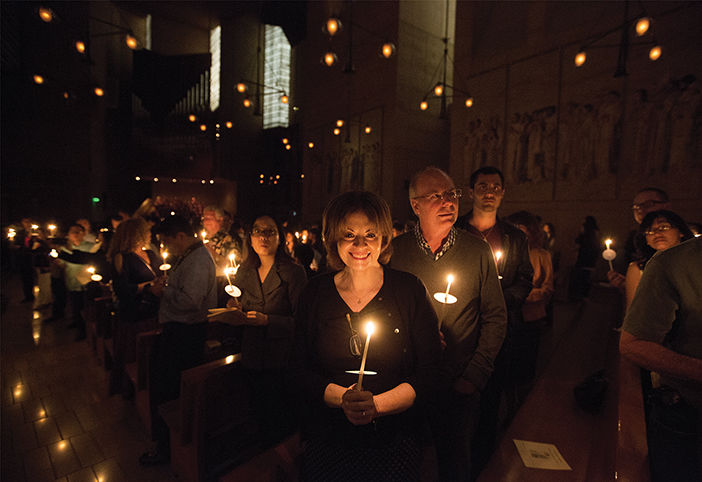It was a beautiful Easter. More than 10,000 people came to join us for worship services at the cathedral during Holy Week. And across the archdiocese, we baptized nearly 2,000 new Christians at Easter.
What a witness to the power and vitality of the Catholic faith here in Southern California!
At the same time, however, this Easter season reminded us that the freedom to worship we enjoy is not widely shared in the world — and may be at risk here too in the years to come.
As Pope Francis said this week, in many places Christians are being “persecuted, exiled, killed, beheaded — for the only reason of being a Christian.”
The persecution of Christians gives us a kind of global perspective on the debates that began here in the United States just before Holy Week.
These debates over Indiana’s new religious freedom law are continuing. And there continues to be a lot of misinformation and disinformation about this new law.
The truth is that Indiana’s law is modeled after the 1993 federal Religious Freedom Restoration Act. This act which was strongly supported by the U.S. Catholic bishops and most other faith groups.
Over the years, this law has helped protect the freedoms of Christians, Jews, Muslims, Sikhs, Native Americans and others — even a group of Chicago churches that used the law to successfully fight a government “ban” on feeding the homeless.
But the issues at stake in the Indiana debate are about much more than the meaning of this one law.
Our country is in a time of change.
Just a generation ago, America was a country where religious faith was publicly respected and churches and other religious institutions were an accepted part of ordinary daily life.
This is no longer true.
Most Americans still profess faith in God, and still pray and worship with others who share their beliefs in churches, synagogues and mosques. Religious institutions still carry out works of charity, justice and social service in most communities.
But our society and culture are growing more secularized. Those who govern and shape the way Americans think and behave — in politics and law, education, entertainment and the popular media — form an increasingly secularized elite that has little tolerance for religious institutions or values.
As a result, secularization and “de-Christianization” has become a kind of unspoken “mandate” in our courts, media, and civic life.
The debates we have been seeing in recent years over such things as prayer and religious symbols in public places, the Church’s role in the public square, health care services, and the “redefinition” of marriage and sexual morality — these are all a part of this broader effort to remove religion from American life.
It is important in all this to remember that as Catholics our faith is not a set of “positions” that we hold on “issues.”
Our faith is rooted in what Jesus has revealed about God’s purposes in creation and his will for every person.
That is why every year during the Easter Vigil, we listen again to the creation story from the Book of Genesis — the beautiful story of man and woman created in God’s image and called to be fruitful and to make this world God’s Kingdom.
In his own teaching, Jesus pointed us back to this “beginning.” He told us that the marriage covenant between man and woman is at the heart of God’s design for creation — and that no one has the power to change that design.
That is why marriage and family are so important for the Church.
And that is why it is no small matter to ask a Catholic — or any Christian, Jew or Muslim — to cooperate with policies that we believe disrespect God’s purposes for creation and his beautiful plan for the human person.
These debates in Indiana and elsewhere across the country are important for the future of our freedoms as Americans and as Catholics. What’s at stake is our ability to live as God calls us to live and to serve him as he calls us to serve him.
Catholics respect the pluralism and diversity of American society. We are not trying to impose our faith on others or deny their rights to believe and live the way they want to.
But I’m sad to say that right now across the country, others are trying to impose their “faith” — a secularized ideology and an anti-religious morality — on religious believers and it is our rights that are at risk of being denied.
So let us pray this week for our country.
May our Blessed Mother Mary help us to a new awareness of the importance of tolerance, religious freedom and respect for conscience.

